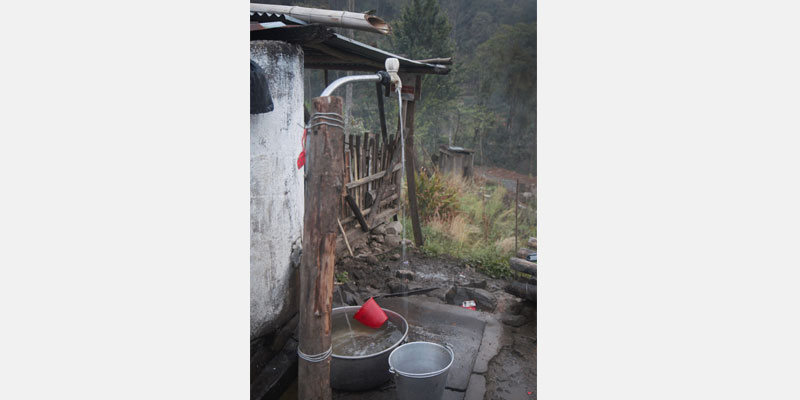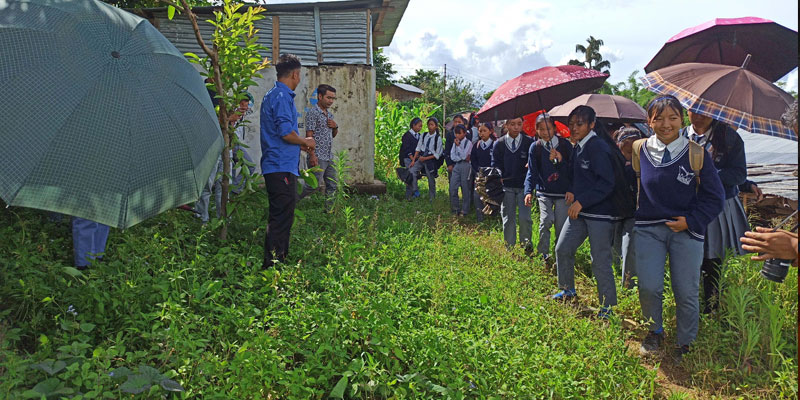
Today, fifty-eight-year-old Chollen Chang is a relieved man. He is the proud recipient of a functional household tap connection (FHTC), an initiative introduced by the Ministry of Jal Shakti, Government of India, through its flagship Jal Jeevan Mission (JJM) scheme.
Water is indispensable for human development. The lack of access to clean water and sanitation for large swathes of humanity remains one of the world’s biggest challenges. The situation is exacerbated in remote areas where the burden of fetching water falls disproportionately on the women and children in the community. That was the case for the women of the Chang community in New Chingmei village, Tuensang district, Nagaland, the community to which Chollen belonged. The lack of access to potable water within their homes meant that the women had to trudge long distances in the morning and evening to fetch water for household needs. A significant portion of time was devoted daily to this laborious task. Chollen’s wife, too, suffered this drudgery.
A dream come true
The Tata Trusts have long been committed to improving the quality of life for millions in underserved communities across the country. Providing and improving access to clean water is an important part of this commitment. To achieve this vision, the Trusts collaborated with the Government of India for the Jal Jeevan Mission, which aims to install Functional Household Tap Connections (FHTC) in every household.
In November 2022, the FHTC installation was completed in New Chingmei village by the Public Health Engineering Department (PHED), Government of Nagaland (GoN). In Tuensang district, the North East Initiative Development Agency (NEIDA), an associate organisation of the Tata Trusts, which was chosen as the Implementing Support Agency (ISA) by PHED undertook the work of community mobilisation, strengthening of Water and Sanitation (WATSAN) Committees and implementing Social Behaviour Change Communication (SBCC) activities in the district. NEIDA collaborated with its local partner, the Eleutheros Christian Society (ECS).
“The successful installation of the FHTC in our home has been a dream come true for our family,” says Chollen. “The moment marked the tangible realisation of our long-held aspiration for a reliable and convenient tap water connection in our homes.”
Capacity building and sustainability
Building the capacity of the village water committees is a key aspect of JJM. The Trusts train village level water committees in various aspects of programme implementation, such as water quality monitoring and surveillance, operation and maintenance, records-keeping, regular supply of water, water tariff collection, rainwater harvesting awareness, artificial recharge, water-saving, etc. Women and youth groups are trained to assess water quality using field test kits. The Trusts not only facilitate the programme by providing access to clean water but also helps to change individual and community behaviour for the sustainable management of their water resources.
In order to plan and execute the JJM programme in New Chingmei village, NEIDA, in collaboration with ECS, organised a series of Social and Behavioural Change Communication events and diverse training programmes to impart essential knowledge and skills necessary for the community to manage their water resources in a sustainable manner. NEIDA also played an important part in reviving and strengthening the Water and Sanitation (WATSAN) Committee, and especially encouraging women to become a part of the initiative. Studies have shown that the participation of women who are the major stakeholder in water management is crucial for the success of initiatives.
A hope-filled future
When a community has access to clean water, life changes in many ways. The benefits are both tangible – improved health, savings in time – and intangible: the time and opportunities for members of the community to develop their full potential, and the hope for a better future. “The Jal Jeevan Mission has had a profound impact on my family,” says Chollen, happily. “It has significantly improved the overall quality of our lives by allowing us to redirect our time and energy towards more productive chores.”
The collaborative efforts of the Government of India, Tata Trusts, NEIDA, WATSAN committees, ECS, and the community have therefore not only addressed the community’s water woes, but also empowered them to become active participants in the sustainable management of their water resources. It has enabled the community to ensure a water-secure future.
As he ruminates over the project’s impact on the well-being and prosperity of his family and community, Chollen is optimistic about the project’s continued success. “I vividly recall the hardships my family faced due to a lack of running water at home,” he says. “Today, we exult in our new-found freedom from drudgery.”











